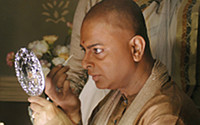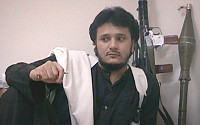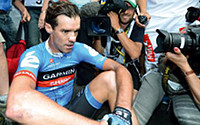| SHADOWS ON THE WALL | REVIEWS | NEWS | FESTIVAL | AWARDS | Q&A | ABOUT | TALKBACK | ||
 Shadows off the beaten path Shadows off the beaten path | ||
| Indies, foreigns, docs, revivals and shorts... | ||
|
On this page:
BIRD OF DUSK |
PATH OF BLOOD TIME TRIAL | WHITNEY < < D O C S > > last update 20.Jun.18 See also: SHADOWS FILM FESTIVAL | ||
 R E V I E W B Y R I C H C L I N E
R E V I E W B Y R I C H C L I N E | ||
Bird of Dusk
| ||
|
dir-scr Sangeeta Datta prd Jaspreet Kaur with Rituparno Ghosh, Soumitra Chatterjee, Aparna Sen, Arjun Rampal, Prosenjit Chatterjee, Konkona Sen Sharma, Sharmila Tagore, Nandita Das, Ranjan Bose, Tapan Biswas, Dorothee Wenner, Cary Rajinder Sawhney  release UK Jun.18 liff
release UK Jun.18 liff18/India 1h37 FILM FEST
|  Moody and evocative, this documentary traces the life of boundary-pushing filmmaker Rituparno Ghosh. With lush new footage shot around his hometown Calcutta, the film explores Ghosh's life and how his work was unusually sympathetic to marginal characters, blending traditions with present-day ideals. His approaches to women's roles and gender fluidity were far ahead of his contemporaries, and still feel progressive.
Moody and evocative, this documentary traces the life of boundary-pushing filmmaker Rituparno Ghosh. With lush new footage shot around his hometown Calcutta, the film explores Ghosh's life and how his work was unusually sympathetic to marginal characters, blending traditions with present-day ideals. His approaches to women's roles and gender fluidity were far ahead of his contemporaries, and still feel progressive.
A lifelong Satyajit Ray fan, Ghosh was a prolific writer-director from 1992 until his death from a heart attack in 2013. He had an economics degree but went into advertising, then started making movies at a time when Bengali films were waning. His work revitalised the industry, as his films had an unusual ability to generate thrills while digging beneath the surface of the stories. Throughout his career, he created especially strong female characters played by a range of top actresses. Warmly supported by his family, friends and colleagues, he is still one of the few openly gay figures in Indian cinema. Moving through his life chronologically, the film is narrated by Soumitra Chatterjee reading from Ghosh's autobiography First Person. This gives everything a lovely firsthand tone, including the film's title reference to an ancient story. Filmmaker Datta sharply captures Ghosh's larger-than-life presence, from his colourful movies to his memorably lavish outfits on film festival red carpets. And there are extensive film clips and behind-the-scenes footage, plus new interviews with a wide range of friends, fellow filmmakers and actors who starred in his films. Ghosh was particularly noted for his collaborative approach, relying on his actors and crew members to put his projects together. He instinctively drew on literary and film history in his work, and his films have a distinct Bengali flavour, with unusual sensitivity to female perspectives. Later in his career he came out publicly and took on LGBT issues head-on, most notably with his award-winning performance as a transgender filmmaker in Kaushik Ganguly's drama Arekti Premer Golpo (2011). Thankfully, Datta doesn't shy away from ways Ghosh ruffled feathers as he rejected the usual processes and restrictions. This is a rather talky documentary, with a constant flow of chatty interviews, autobiographical snippets and movie dialog. All of these words pack the film with telling details both about Ghosh and the local film industry. They also make this a remarkably comprehensive exploration of Ghosh's personal and professional lives, his place in history and his lasting impact on cinema. And how he continues to challenge Indian society after his death. | |
|
PG themes 18.Jun.18
| | |
 R E V I E W B Y R I C H C L I N E
R E V I E W B Y R I C H C L I N E | ||
Path of Blood
 MUST
MUST  SEE SEE
| ||
|
dir-prd Jonathan Hacker voices Samuel West, Tom Hollander  release UK/US 13.Jul.18 18/UK 1h32 |
 A darkly unsettling documentary, this film takes us deep into the life of al Qaeda operatives in Saudi Arabia between 2003 and 2009. What makes it unusual is the fact that the film is compiled from footage that was shot by the terrorists themselves, as well as the Saudi security officers trying to catch them. This means that there's quite a lot of harrowing imagery from angles we're not used to seeing. It also takes the film far beyond headlines and preconceptions.
A darkly unsettling documentary, this film takes us deep into the life of al Qaeda operatives in Saudi Arabia between 2003 and 2009. What makes it unusual is the fact that the film is compiled from footage that was shot by the terrorists themselves, as well as the Saudi security officers trying to catch them. This means that there's quite a lot of harrowing imagery from angles we're not used to seeing. It also takes the film far beyond headlines and preconceptions.
As the Saudi security services raided al Qaeda cells around the country, they videotaped their operations. And in the process they also seized a huge stash of home videos shot by the young terrorists as they trained in their boot camps, preparing and carrying out attacks around the country on targets they saw as anti-Muslim. Amid car bombs near Western compounds, brutal kidnappings and violent rampages, the Saudi government worked to push al Qaeda out of the country. But these idealistic, brainwashed young men are dedicated to their cause. These stories have never been told from this perspective, and filmmaker Hacker boldly presents the footage without commentary, although the style in which he assembles it creates a powerfully horrific tone, mainly thanks to Chad Hobson's intense score. There's also a somewhat mannered editing style, as the film cuts to blackened video fuzz every time narrator West speaks. And his words are as portentous as those from Hollander, who is the voice of "Jihad", proclaiming victory after each murderous attack. This unnerving approach eliminates every possibility to moralise; indeed, the film often seems to sympathise with these naive men who have been carefully lured into what seems like a thrilling adventure. And there are chilling moments as they look into their cameras when we can see their doubts, or possibly their realisation that this is based on lies. It's fascinating to watch the Saudi government confront this misinformation with their own campaign using imams and ex-terrorists who talk about the true peaceful nature of Islam and the falsehoods perpetuated by al Qaeda recruiters. In this sense, the film also has terrifying parallels within Western society, where often uneducated people are manipulated by slanted media and outright lies to back issues and candidates that serve a vile, destabilising agenda (witness the Daily Mail on Brexit or Fox News on Donald Trump). This adds a serious chill to the documentary's big assault sequences, in which government forces launch all-out war on al Qaeda. But of course this didn't solve the problem. And the fact that the film offers no real sense of hope makes it that much more alarming. | |
|
18 themes, language, strong violence 3.May.18 | ||
 R E V I E W B Y R I C H C L I N E
R E V I E W B Y R I C H C L I N E | ||
Time Trial

| ||
|
dir Finlay Pretsell prd Sonja Henrici, Finlay Pretsell with David Millar, Thomas Dekker, Mark Cavendish, Bradley Wiggins  release US Mar.18 sxsw,
release US Mar.18 sxsw, UK 25.Jun.18 17/UK 1h22
|  Director Finlay Pretsell and cinematographer Martin Radich take a bracingly original approach to this documentary about Scottish cyclist David Millar. Instead of the usual narrative, the film immerses the audience in the situation as Millar launches a comeback following his two-year ban for using illegal substances. With its moody tone and intense footage, this is a film we experience rather than just watch.
Director Finlay Pretsell and cinematographer Martin Radich take a bracingly original approach to this documentary about Scottish cyclist David Millar. Instead of the usual narrative, the film immerses the audience in the situation as Millar launches a comeback following his two-year ban for using illegal substances. With its moody tone and intense footage, this is a film we experience rather than just watch.
After becoming the most successful British cyclist in history, Millar admitted taking banned drugs and in 2004 had to step away from competitive cycling for two years. When he came back to the sport, he quickly became an outspoken anti-doping activist. The film catches up with him in the 2014 season, as Millar realises that his time as an athlete is winding down. At 37, he's feeling the pressure from young riders who take a very different approach to the sport. He has one last chance to qualify for the Tour de France as he rides with his team at qualifying races across Europe. Unusually for a doc, no one on-screen is ever identified, and there are only the occasional offhanded to-camera comments from Millar. Even these are unedited, often including long pauses as Millar reveals his reluctance to talk about the experiences he has had. The film traces his progress through the qualifying events without commentary, carefully observing his preparations and practice, and then the camera follows him out on to the road, revealing the physical exertion and emotional toll the sport takes on him. This approach also captures the camaraderie between cyclists in a way we've never seen before, as they tease and encourage each other. And extended sequences involving Millar and his support team are fascinating, for example as he collects water bottles during the race for his teammates but neglects to get one for himself. Or when he attempts a change of gloves and jacket while riding up a shivery cold, rainy mountainside. These kinds of details bring the sport into sharp relief, making it unusually personal. It also makes Millar's own story that much more emotionally connective, as he admits his mistakes and tries to return to the sport not just as a clean rider but making a clear statement against doping of any kind. That said, Pretsell never explores his life off the road, only glimpsing his family in photographs. Their presence within the narrative might have made the film even more intimate and powerful. But as it is, this is a remarkably contained portrait of a cyclist's daily grind. | |
|
15 themes, language 17.Apr.18
| | |
 R E V I E W B Y R I C H C L I N E
R E V I E W B Y R I C H C L I N E | ||
Whitney

| ||
|
dir Kevin Macdonald prd Jonathan Chinn, Simon Chinn, Lisa Erspamer with Whitney Houston, Bobby Brown, Cissy Houston, Kevin Costner, Michael Houston, Gary Garland-Houston, Mary Jones, Aunt Bae, Clive Davis, LA Reid, Nicole David, Steven Gittelman  release UK/US 6.Jul.18 18/UK Altitude 2h00 EDINBURGH FILM FEST
|  After last year's doc Whitney: Can I Be Me, it seems a little odd to have another one so soon that recounts the same information without any particular new insight. While that film centred on backstage footage from Whitney Houston's final world tour, Kevin Macdonald takes a more traditional approach, telling her life story chronologically with the help of friends and family. There's one key new revelation, but the holes in her profoundly sad story are still here.
After last year's doc Whitney: Can I Be Me, it seems a little odd to have another one so soon that recounts the same information without any particular new insight. While that film centred on backstage footage from Whitney Houston's final world tour, Kevin Macdonald takes a more traditional approach, telling her life story chronologically with the help of friends and family. There's one key new revelation, but the holes in her profoundly sad story are still here.
Narrated mainly through interviews with Houston's brothers Michael and Gary, the film traces her life growing up in New Jersey with singer mother Cissy, who groomed her to become a gospel-pop crossover star. Drug use was part of the siblings' life from their teen years, and it became a problem for Houston later in life, especially during her troubled marriage to Bobby Brown. This strained her lifelong friendship with Robyn Crawford. And as her life spiralled out of control, those around her were too caught up in making money to help. The narrative is a fairly standard showbiz one (see also Amy), as a talented young artist is relentlessly exploited by the people she should be able to trust. Filmmaker Macdonald presents the events in order, then drops in the bombshell about her childhood abuse at the hand of her cousin Dee Dee Warwick. Placing this revelation at the end undermines its impact, pulling it out of context for nothing more than tabloid-style shock value. Otherwise, the film is notable for telling Houston's story from the perspective of the people closest to her, with notably emotional comments from her personal assistants Mary Jones and a family friend identified only as Aunt Bae. Meanwhile, Brown's flat-out refusal to speak about drugs feels very odd. And the complete absence of Crawford (as in other docs) leaves a nagging gap at the centre of the story, because she's the only one who could put an end to the conjecture. As a depiction of Houston's life and death, this film is a remarkable collection of interviews and footage, including several telling backstage clips and a lot of music. But it never quite gets under the surface, relying on tired cutaways to put the events in the context of American pop culture (when her career goes stratospheric, there's a shot of the space shuttle blasting off). Still, this is a story that needs to be told, and there are details that still need to be uncovered. | |
|
15 themes, language 4.Jun.18 | ||


See also: SHADOWS FILM FESTIVAL © 2018 by Rich Cline, Shadows
on the Wall
| ||